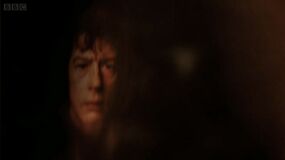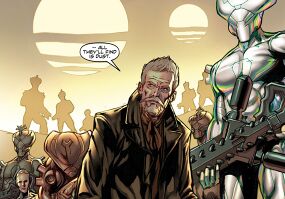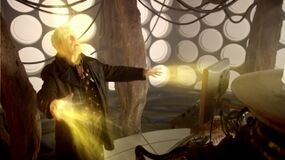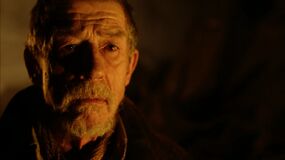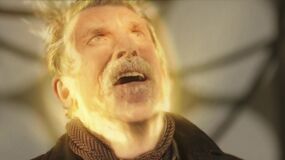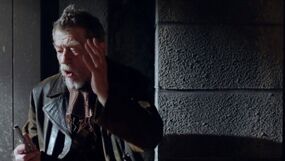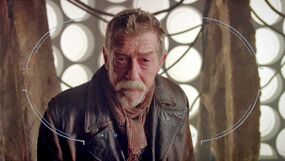War Doctor: Difference between revisions
Tag: sourceedit |
Tag: sourceedit |
||
| Line 130: | Line 130: | ||
When the Twelfth Doctor returned to Gallifrey and faced [[Rassilon]]'s firing squad, the Time Lord military showed reluctance to stand against the Doctor due to their history with his war incarnation. When ordered to fire upon the Doctor, the soldiers, out of respect for the Doctor's accomplishments in the war, purposefully missed him and sided with the Doctor in the [[coup against Rassilon]]. ([[TV]]: ''[[Hell Bent (TV story)|Hell Bent]]'') | When the Twelfth Doctor returned to Gallifrey and faced [[Rassilon]]'s firing squad, the Time Lord military showed reluctance to stand against the Doctor due to their history with his war incarnation. When ordered to fire upon the Doctor, the soldiers, out of respect for the Doctor's accomplishments in the war, purposefully missed him and sided with the Doctor in the [[coup against Rassilon]]. ([[TV]]: ''[[Hell Bent (TV story)|Hell Bent]]'') | ||
While the Twelfth Doctor was on the planet [[Eed'n]], he became infected with pollen from the plants and possessed by [[The Plant|the entity that controlled all of Eedin's plants]], but he was able to fight off the possession by summoning the memories of his past incarnations, such as the War Doctor. ([[COMIC]]: ''[[Petals (comic story)|Petals]]'') | |||
== Psychological profile == | == Psychological profile == | ||
Revision as of 19:38, 22 September 2016
Originally young and robust, the War Doctor (also known as the Doctor of War) set upon the warrior path for which he had been intended, and disavowed the name of "the Doctor". Though the Time Lords and Daleks continued to refer to him by that name, he was also referred to as "the Warrior" and "the Renegade".
After becoming old and tired of battle and faced with the end of reality, the Doctor considered activating the Moment, to end the Time War by committing genocide against both the Daleks and his own people. However, the Moment's sentient interface led him down a different path by letting him view his future first-hand. By teaming up with his later selves, his mind was opened to a heroic way to end the Time War in lieu of the deadly alternative he was going to enact.
Knowing he could unite with former and future Doctors in force, the War Doctor helped to save Gallifrey from destruction, and although he was not able to retain these memories, believing himself to have destroyed Gallifrey, the Eleventh Doctor retained the memories, and eventually remembered him as the man who saved Gallifrey, restoring the War Doctor as an embraced and respected incarnation.
After battling in the Last Great Time War for a remarkably long time, this incarnation eventually regenerated into a younger form due to advanced old age after he had helped save Gallifrey and reclaimed his good name.
Due to him saving Gallifrey and the Time Lords, he was remembered as a war hero who commanded a great deal of respect from the Time Lord military. One soldier stated that, during the Time War, the War Doctor was noted for going into battle unarmed, but winning nonetheless, with his unarmed state being the last thing many saw.
Biography
Foreshadowing
When Ace was sent into the Seventh Doctor's mind, she discovered a room with thirteen cubicles, seven of them empty, while the other six contained shadowy white figures, representing the Doctor's future incarnations. (PROSE: Timewyrm: Revelation)
Prior to his arranged execution on Tor-Ka-Nom, the Eighth Doctor told the attending priest that he believed in reincarnation, but that he had "a nasty feeling it [was] not going to apply [that] time." The execution was successfully avoided due to Izzy Sinclair's intervention. (COMIC: By Hook or By Crook)
After the Eighth Doctor was stabbed in the chest by the Master, Izzy implored him to regenerate, but the Doctor told her that the Master had used a certain energy that inhibited the regeneration. The Doctor was healed by Kroton when he became the controller of the Glory. (COMIC: The Glorious Dead)
When his memory began to fail, the Eighth Doctor took it as a sign that he would regenerate soon. (PROSE: The End) Before the Last Great Time War, the Doctor could feel his regeneration coming. (PROSE: Museum Peace)
Regeneration
When the Last Great Time War erupted, the Eighth Doctor refused to fight in the conflict, instead helping out its victims wherever he could. (TV: The Night of the Doctor) In the Fifth Segment of the War, (PROSE: The Stranger) he discovered a woman named Cass trapped aboard an out of control starship, inbound for the planet Karn. He attempted to rescue her from the vessel, but Cass rejected his offer due to him being a Time Lord. He refused to leave her, letting himself die with her as the ship smashed into Karn's surface.
However, he was revived by the Sisterhood of Karn, who offered him the ability to control his regeneration and become the person he needed to be in order to end the Time War. Initially he refused, but after seeing Cass' corpse, on top of the many other tragedies of the Time War, the Doctor's spirit finally broke. Accepting their help, he drank a specially-made formula of the Elixir of Life, and regenerated into the warrior the Time War needed. The new Doctor promptly rejected his name , declaring, as he picked up and donned Cass' bandoleer, "Doctor no more", (TV: The Night of the Doctor) renaming himself "the Warrior" for a time. (PROSE: The Stranger)
Fighting in the Time War
Sontarans told legends of the Doctor leading the Time Lords into battle, (TV: The Sontaran Stratagem) with soldiers like Gastron serving with "the Doctor of War" on the Skull Moon. (TV: Hell Bent) Likewise, the Daleks became frightened of his mere presence in the war (TV: The Day of the Doctor) and referred to him as "the Oncoming Storm", (TV: The Parting of the Ways) and "the Predator". (PROSE: Engines of War)
During the War, the Doctor fought against the Daleks, the Nightmare Child, the Horde of Travesties, the Army of Meanwhiles and Neverweres, and the Skaro Degradations and their kin. (PROSE: A Prologue)
He took on the Squire as a companion, showing her the prose of Marcel Proust during their travels. (COMIC: The Then and the Now) With the Squire, the Doctor led a Shrikefleet against a Plasma-Wheel armada on Vexa, held the line against six Barrage-Leks and routed the exotic plunder at the chronofracture on Borun, and threw down the Heisenberg mutations on Kether Prime. (COMIC: Pull to Open)
After the Daleks recruited the Cyclors, the War Doctor was sent to deal with them. (COMIC: Pull to Open) He teamed up with the Master, and the duo went to Veestrax, where they found a wall with the phrase "Exterminhate" on it. The Doctor asked for the Master's help in blowing that planet up. The Doctor instead transported part of Veestrax to another part of the universe in order to wipe out three Dalek assault battalions. (COMIC: Outrun)
The Doctor and the Master landed on the Overcast homeworld, Golgalith. (COMIC: The Then and the Now, The Organ Grinder) With the Master's help, the Doctor planned to meddle with time and neutralise the Cyclors. (COMIC: The One) The duo soon encountered the Volatix Cabal, together killing one of its members. The Doctor then encountered Alice Obiefune, who had travelled in the Master's TARDIS from a point after the War had ended. The Doctor sent the Squire to save Alice and afterwards brought everyone to an Overcaste rebel base. The Doctor and the Master succeeded in uncovering a Volatix spy within the group, but were too late in stopping him from summoning a Cyclor to their location. (COMIC: The Organ Grinder) They ran from the Cyclors, and the Doctor soon realised that Alice had stolen the Psilent songbox from him. The Doctor and his companions caught up with Alice, who refused to hand over the Songbox. Alice used the Songbox and banished the Cyclors to a higher dimension. Unbeknownst to the Doctor, the Master had attempted to flee in the version of his TARDIS that Alice brought from the future. The Master's actions created a paradox that reacted with the Songbox, which in turn began to collapse timelines, resulting in chronal meltdown. (COMIC: Kill God)
The Doctor's actions on the planet unleashed the Malignant, which resulted in the deaths of fifty generations of the planet's people. (COMIC: The Then and the Now) The War Doctor lost a month's memory due to the event. The Eleventh Doctor was unable to remember what happened at all. (COMIC: Pull to Open)
The Keska incident
The Doctor dematerialised his TARDIS at Omega One as two Time Lords were about to detonate the Dalek's Time Destructor on the Dalek Fleet. The Doctor allowed the Time Lords to return home and detonated the device himself. The Doctor was found in a coma on the planet Keska, and was nursed to health by Rejoice, a native Keskan. He wanted to help the Keskans stop the Taalyens from wiping them out, and constructed a force field to do this. Cardinal Ollistra used power from the Eye of Harmony to drag him back to Gallifrey. (AUDIO: The Innocent) He was then sent to find Seratrix in the Null Zone with Veklin by Ollistra because he was an expert on the Daleks. He decided to disobey these orders and accidentally entered the Null Zone. He landed on Keska and discovered that the Daleks had helped the Taalyens bypass the force field. He met with an older Rejoice. He discovered that Seratrix wanted to make peace with the Daleks to stop the Time War. (AUDIO: The Thousand Worlds) He tried to tell Seratrix that his work was stupid as the Dalek plan to administer a defensive empire in the Null Zone wasn't possible. He planned to show Seratrix the true Dalek plan. He did this by hacking into the Dalek systems. He destroyed the Daleks by deafening them. He stopped the Dalek plan by detonating the drill early. By this point he had accepted that he was a monster. (AUDIO: The Heart of the Battle)
War criminal
The Doctor destroyed the Annihilator on Vildar, but a Time Lady named Collis, who had been sent to retrieve it, died protecting him from Varga plants. Now deemed dead, the Doctor found himself on Aldriss, the planet of the Technomancers, where they had been reviving dead Time Lords, such as Collis, outraging the Doctor when he found out that the Valdarians were being sacrificed to revive the dead. Discovering that a small part of the Technomancer's masters, the Horned Ones, were also being placed in the revived Time Lords, Collis and the Doctor ran to the Crypt of Non-Time, where the Annihilator resided after the Doctor had used it to wipe itself from time. After Collis died at the hands of the Technomancer leader, Shadovar, the Doctor set the Annihilator off, wiping the Technomacers and the Horned Ones from time. It was this act which Ollistra used to imprison him. (AUDIO: Legion of the Lost)
He was placed in an Artron leash. With Ollistra, Jarad and Solex he went to Asteroid Theta 12. He was also tasked with discovering the purpose of the anima device. When he went to save Jarad, Ollistra accused of him of still keeping his values of his rejected name. He discovered that the Daleks were retro engineering themselves back into Kaleds, in order to get new insights into war. When he discovered the use of the anima device he allowed Ollistra to use it so they could escape. (AUDIO: A Thing of Guile)
Ollistra had programmed the TARDIS to travel into the Neverwhen explosion. There he witnessed the results of the Time Lord weapon. He initially helped a set of soldiers against an aggressor. He saw that time phasing at first hand when he saw Kaleds evolving into Daleks, and Time Lords retro-evolving into Cave Men before the Dark Times. Ollistra caught up with him and told him to dismantle the Neverwhen so that she can use it in conjunction with the anima device to destroy Skaro. Instead, stopped it from working in the first place. The Doctor later used it to create a state of peace where both Daleks and Time Lords were farmers. Ollistra planned to use it along with the Neverwhen to destroy Skaro. (AUDIO: The Neverwhen)
Missions of war
During the year A10%? on the planet Marinus, the Doctor assisted the Voord in setting up a chronic tripwire against the Daleks. After a Dalek flying saucer fell into the trap, and the Daleks onboard turned to dust, the Doctor and the Voords went in to investigate, but not before the leader's Paradox Shield failed and he passed on his leadership and liquid-metallic bodysuit in his last moment.
Inside the downed saucer, the Doctor talked with a Voord named Siatak about how the Time War had caused the Voord to become more formidable beings, and Siatak's fears of the Time Lords reverting the Voords' development in the event they won the war. As his relationship with the High Council was complicated, and due to his inability to make grand promises in wartime, all the Doctor could do was to offer to act as an intermediary for the Voord if the Time Lords were still prepared to listen to him after the war, though this did not stop Siatak from fearing the future. (COMIC: Four Doctors)
The Doctor travelled back to Gallifrey during the First Segment of the War to stop the Daleks from wiping out Gallifreyan children. He went to the munition factory inside the Mountain of Serenity and saved Rojan, Gahnna and several other children from a Dalek attack, but Senior Tahl chose to sacrifice himself to save the children from the Daleks. Entrusting Rojan with the children's safety, the Doctor left in his TARDIS. (PROSE: The Stranger)
Late in the War, the Doctor was ordered by Lord President Rassilon to find the War Master, who had fled from the War, but the Doctor couldn't find any trace of his old enemy. (PROSE: Engines of War)
Events in the Tantalus Eye
Leading a flotilla of Battle TARDISes to the Tantalus Eye to engage the Daleks, the Doctor crashed on Moldox after evading his TARDIS out of the way of a Dalek stealth ships ambush that wiped out the flotilla. On Moldox, the Doctor met Cinder, and used her help in investigating a Dalek base, where he found Temporal Weapon Daleks, a new breed of Dalek that possessed weaponry capable of removing living creatures from existence, and discovered that the Eternity Circle of Daleks were building a De-mat weapon in a plan to wipe Gallifrey from history.
The Doctor took Cinder to Gallifrey in order to warn the Time Lords of the Daleks' plan. The Doctor told Rassilon and the High Council of the Daleks' plan, and Rassilon decided to use to Tear of Isha to wipe the Dalek presence from the Eye, killing all other life in the area in the process. The Doctor was against this plan, so Rassilon had him and Cinder thrown into a prison cell.
With Cinder's help, the Doctor broke free of the prison. Picking up Karlax, now was on the verge of regenerating after ambushing the TARDIS, the Doctor and Cinder escaped to the Death Zone in order to find Borusa, whom Rassilon was using as a possibility engine to predict the outcome of battles in the War. After leaving Karlax to recover in the Zero Room, the Doctor and Cinder travelled to confront the Daleks near the Tantalus Eye after disposing of the Tear in the distant future. The Dalek leaders attempted to forcibly convert the Doctor into the prototype of the new Predator Dalek — unable to comprehend that doing so would deprive the Doctor of the very advantages they sought to harness but they were saved when Karlax recovered from his regeneration and tried to escape in the TARDIS, which responded to a program that the Doctor had added that would cause it to home in on a tracking signal implanted in Cinder by the Time Lords. Outraged, Karlax attempted to kill the Doctor, but Cinder jumped in the way of the blast to protect him. In revenge, the Doctor set the TARDIS to leave Karlax behind as it dematerialised, leaving him to be exterminated on board a Dalek command station. Bleeding to death, Cinder died on the floor of the TARDIS.
The Doctor had the opportunity to use Borusa's possibility engine to create an alternate timeline where Cinder survived, but knew she would have preferred that he ensure the Eternity Circle of Daleks never existed. The Doctor took Borusa to the Tantalus Eye, the proximity of which gave Borusa the ability to change the timelines to his preference. The Doctor used Borusa to wipe out the Dalek presence from the Eye, thus ending the Dalek plan, but at the price of Borusa's death.
The Doctor then journeyed to Moldox after going around searching for information about how to find the cadavers of Cinder's deceased family, who were all murdered by Daleks and left to rot in the ruins of their own home. The Doctor buried the skeletal remains of Cinder's mother, father and brother along with Cinder's body, and erected a wooden grave marker that bore her real, beautiful human name. After paying his respects to the fallen family, he stood and looked defiantly at the Tantalus Eye. In honour of Cinder's death, the Doctor vowed to put an end to the War once and for all, promising "no more". (PROSE: Engines of War)
Last day of the War
After fighting the Time War for "a very long time", (TV: The Day of the Doctor) the Doctor learnt of Rassilon's plan to rupture the Time Vortex and destroy the universe, and took it upon himself to end the war. (TV: The End of Time) He was able to breach the Omega Arsenal, a repository of forbidden weapons, and took the Moment, a weapon of ultimate destruction which had developed a sentience and conscience of its own. (TV: The Day of the Doctor)
The Doctor appeared at the fall of Arcadia, (TV: Doomsday) in the midst of an attack by the combined Dalek Fleet of about ten million ships (TV: Dalek) with a "billion billion" Daleks descending on Gallifrey. His presence baited several Daleks away from innocent Gallifreyan refugees fleeing the ravaged city, who became solely concerned with eliminating him, as he used a soldier's gun to inscribe the words "no more" onto a wall as a message to the Time Lords and the Daleks. He then destroyed the group of Daleks with his TARDIS as he left, (TV: The Day of the Doctor) disappearing from Time Lord observation. (TV: The End of Time)
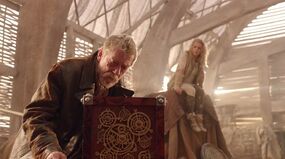
Choosing to activate the Moment far away from his TARDIS so that it would not witness the terrible act he was about to commit, (TV: The Day of the Doctor) and acting on a dream he had had in his childhood, the Doctor retreated to the barn he slept in as a child, (TV: Listen) where the Moment's interface manifested into the form of Rose Tyler, a future companion of his, to challenge his use of the weapon and warning him that he would one day count the innocent children on Gallifrey that would be among those killed if he used the weapon.
Upon realising that the Doctor saw no other way to end the Time War than by using it, the Moment created a time fissure that sent him into his future, in order to witness the effects that making such a choice would have upon him. He met with the Tenth and Eleventh Doctors in 1562 England, and ended up thrown in the Tower of London by Queen Elizabeth I, posing as a Zygon the Tenth Doctor had been tracking. Not realising that she left their cell door unlocked, the War Doctor placed the calculation to disintegrate the structure of the prison door as a permanent subroutine in the sonic screwdriver, which were completed by the Eleventh Doctor's time. Before they could put the calculations to use, the Eleventh Doctor's companion, Clara Oswald, opened the unlocked door, freeing them, but they were unable to escape from the Queen.
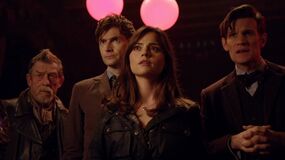
Elizabeth, revealing her masquerade, showed the Doctors that the Zygons were placing themselves inside stasis cubes so that they would awaken when Earth became a more advanced place to invade. Realising the Black Archive, which the Zygons had taken over in Earth's future, was impenetrable from the TARDIS, the War Doctor deduced a way in, which involved the Eleventh Doctor ordering McGillop to place the stasis cube, Gallifrey Falls No More, inside the Archive before the Zygon attack. The three Doctors and Clara froze themselves inside the cube, where they fought a Dalek and blasted their way into the Black Archive. The Doctors wiped the minds of Kate Stewart, Osgood, McGillop, and the Zygons impersonating them, forcing them to cancel the detonation of a nuclear weapon beneath the Archive and begin peace talks between the humans and Zygons, as neither side knew which ones were real or fake.
Feeling that the regret his future selves felt for destroying Gallifrey had led them to save many worlds, the War Doctor, after speaking with Clara, decided to activate the Moment. However, the Tenth and Eleventh Doctors joined him to press the button, forgiving him and themselves for the atrocity they committed, until Clara insisted that they find another way. After the Moment showed them a projection of the suffering of the Time War, the Eleventh Doctor decided not to use the Moment, and came up with a plan that involved saving Gallifrey.
Informing the General of their plan, the Doctors were joined by their nine other incarnations, as well as a future incarnation, to freeze Gallifrey in a pocket universe. Meeting up at the National Gallery, the War Doctor voiced his uncertainty of their success to the Tenth and Eleventh Doctors, but took solace in the fact they may have "failed at the doing the right thing, as opposed to succeeding in doing the wrong". He was also pleased that he could call himself "the Doctor" once again. Reminding himself that he will forget his attempt to save Gallifrey due to the timelines being out of sync, the Doctor bade farewell to Clara and his future selves, and left in his TARDIS. (TV: The Day of the Doctor)
Death
As soon as he set the TARDIS for flight, the Doctor noticed that his regenerative process had triggered automatically. Commenting on how his body was "wearing a bit thin", the Doctor mused how he hoped his next incarnation's ears would be "a bit less conspicuous", as he regenerated into his next incarnation with a peaceful smile on his face. (TV: The Day of the Doctor)
His successor would once again use the name "Doctor" after he regenerated, (TV: Rose) but, due to the timelines being "out of synch," had lost all memory of what had happened at the end of the Time War, (TV: The Day of the Doctor) believing that he had destroyed Gallifrey, and that he was the last of the Time Lords, (TV: Dalek) leaving him and his two successors attempting to forget about their War incarnation, (TV: The Name of the Doctor, The Day of the Doctor) while the Time Lords hailed him a war hero. (TV: Hell Bent)
Legacy and post-mortem
While the Doctor made no secret of his part or actions in the Time War, (TV: Rose, Dalek, Doomsday, The Sound of Drums, The Doctor's Wife) he instead chose to reject who he was during the war, considering that incarnation to be "the one who broke the promise" of his chosen name as "the Doctor" (TV: The Name of the Doctor, The Day of the Doctor) However, despite his attempts to forget, the Doctor occasionally thought about his war incarnation, (PROSE: Nothing O'Clock) and even confided his existence to River Song. (TV: The Husbands of River Song)
When the Ninth Doctor's mind was under siege from Arnora, he was forced to remember his war incarnation and the painful memories associated with him and the Time War, as well as his eighth incarnation's involvements with the war prior to becoming the War Doctor, causing him a lot of agony. (COMIC: Weapons of Past Destruction)
The War Doctor's actions against the Overcast would lead them to eventually arrest the Eleventh Doctor, to chase and prosecute him for his previous incarnation's actions. (COMIC: The Then and the Now) During an imaginary interrogation session with the ten incarnations that he chose to remember, the Doctor acknowledged that the War Doctor's life was a period he wouldn't remember and that his "recklessness" and "thoughtless" actions were simply not his "style". (COMIC: Pull to Open)
When The Then and the Now attempted to ingest the Eleventh Doctor's timeline, the Doctor briefly retro-regenerated back into the War Doctor. Being an "X-rated" period of his life that the Doctor resisted, this halted the ingestion. (COMIC: Outrun)
When the Eleventh Doctor entered his Time stream to save Clara Oswald, he encountered his war incarnation, who he described as "[his] secret". As the Doctor carried an unconscious Clara away, the War Doctor turned around and watched them with a sombre stare. (TV: The Name of the Doctor)

When the Eleventh Doctor entered into the T'keyn Nexus in order to defend himself, Matrix projections of his previous incarnations appeared inside it to defend themselves as well, though the War Doctor decided not to defend himself, leaving it to the Eighth Doctor to defend his actions in the Time War. When the Eleventh Doctor began to deduce Sondrah's true identity, the past Doctors faded away as Oscar Wilde interfered with the Nexus. (COMIC: Dead Man's Hand)
Ultimately, the Doctor remembered the true result of the Time War. After reassessing the War Doctor, his tenth incarnation declared that the war incarnation had been "the Doctor more than anybody else", while the eleventh incarnation noted that the War Doctor was "the Doctor on the day it wasn't possible to get it right" and honoured him by addressing him as Doctor again.
Later, as the Eleventh Doctor dreamed about his search for Gallifrey, he included his war incarnation alongside his ten other incarnations in the dream, further showing his acceptance of the War Doctor. (TV: The Day of the Doctor)
The Doctors' actions in the Black Archive served as the inspiration for the Osgood Boxes, with the Twelfth Doctor specifically using his regrets for what he had to do as the War Doctor in order to persuade the Zygon rebel leader, Bonnie, to stand down and walk away from her war campaign. (TV: The Zygon Inversion)
When the Twelfth Doctor returned to Gallifrey and faced Rassilon's firing squad, the Time Lord military showed reluctance to stand against the Doctor due to their history with his war incarnation. When ordered to fire upon the Doctor, the soldiers, out of respect for the Doctor's accomplishments in the war, purposefully missed him and sided with the Doctor in the coup against Rassilon. (TV: Hell Bent)
While the Twelfth Doctor was on the planet Eed'n, he became infected with pollen from the plants and possessed by the entity that controlled all of Eedin's plants, but he was able to fight off the possession by summoning the memories of his past incarnations, such as the War Doctor. (COMIC: Petals)
Psychological profile
Personality
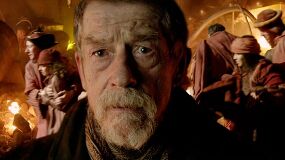
Full of self-doubt and self-loathing, the War Doctor not only thought himself unworthy of the name of "the Doctor", (TV: The Day of the Doctor) dispatching the moniker immediately after regeneration (TV: The Night of the Doctor) in favour of the title of "Warrior", (PROSE: The Stranger) but also of any identity at all, eventually leaving it to others to choose how they wished to address him. (PROSE: Engines of War)
He acknowledged that the Time War had changed him, (PROSE: The Stranger) and made him unable to make the same promises his previous incarnations could, (COMIC: Four Doctors) and also reflected how he was a lesser man than his successors, having became great men from the guilt they had for his actions, and viewed it as his privilege to light the flame that forged their greatness. (TV: The Day of the Doctor)
Convincing himself to believe he was a different man with different ideals to his predecessors, the War Doctor was prone to bouts of anger and rage, roaring in grief for Cinder and the Fifth Time Lord Battle Fleet, and picking up Karlax by the throat and hoisting him in the air when provoked. (PROSE: Engines of War) He could also be stern, as indicated by his dislike for childlike vocabulary, considering the fact that the Eleventh Doctor used such words as a proof that he was ashamed of being a grown-up. (TV: The Day of the Doctor)
Due to his advanced age, the War Doctor was cagey and cranky, tired of the suffering and anarchy the Time War had caused, having lost the will to survive beyond the war and his self-beliefs, (TV: The Day of the Doctor) but still maintained a whimsical charm, addressing the TARDIS as "old girl", not wishing to get his boots dirty in case he stepped in the TARDIS and made a mess, (PROSE: Engines of War) speaking kindly to Clara Oswald, (TV: The Day of the Doctor) laughing at jokes he accidentally made, (PROSE: The Stranger) and reassuring Siatak that he would act as an intermediary between the Time Lords and the Voords when the war ended. (COMIC: Four Doctors) He berated his future selves for pointing their sonic screwdrivers as weapons, calling the screwdriver a "scientific instrument, not [a] water pistol", though later found himself wielding his screwdriver in a similar fashion against an attacking Dalek. (TV: The Day of the Doctor)
The Doctor also displayed a confident recklessness, as he considered politely asking a Dalek to take him and Cinder prisoner to infiltrate Andor, approached a Dalek flying saucer with the intention of walking onboard instead of sneaking on, decided his way around the Dalek saucer with "Eeny, meeny, miny, moe", and confidently walked out to met the Eternity Circle after asking some Dalek soldiers to "take [him] to [their] leader". (PROSE: Engines of War)
Unlike his other incarnations, the War Doctor endorsed the use of weapons, allowing Cinder to bring her gun aboard the TARDIS, using a Temporal Cannon to defend himself from a Dalek, (PROSE: Engines of War) and wielding a gun during the Fall of Arcadia to carve an inscription on a wall. (TV: The Day of the Doctor) However, he was known to enter battles unarmed in the War, (TV: Hell Bent) berated Cinder for pointing her gun at him when he showed no hostilities, (PROSE: Engines of War) and had a reluctance to have weapons aboard the TARDIS, owing to the fact she didn't like them. (TV: The Day of the Doctor; PROSE: Engines of War)
Also contrary to his other incarnations, the War Doctor did not take on companions unless it was absolutely necessary, or they proved to be capable of defending themselves, as he feared his inability to protect them, instead taking comfort from the sound of the TARDIS control console. (PROSE: Engines of War)
Similar to his second and seventh incarnations, the War Doctor was also painfully aware of the need to see the "bigger picture". He knew it would be selfish to undo Cinder's death instead of stopping the Daleks, (PROSE: Engines of War) and that it was entirely proper to sacrifice his people if it would save the universe. (TV: The Day of the Doctor) When his eleventh incarnation questioned him in their time stream on the actions that he had to make during the war, the War Doctor responded by defending those actions, stating he had "no choice" and that he did what he did "in the name of peace and sanity." (TV: The Name of the Doctor) Despite focusing on the grand scale, the Doctor still had his limits, being appalled by the depths Rassilon and the High Council had sunk to in the war, and was both outraged and disgusted when he found out Rassilon had retro-evolved Borusa into a possibility engine. (PROSE: Engines of War)
The Doctor could react mercilessly to a situation; boiling Kaled mutants alive, attempting to subject a Dalek to a Temporal Cannon, leaving Karlax to his own death after Cinder's murder, (PROSE: Engines of War) and unceremoniously mowing down attacking Daleks with his TARDIS. (TV: The Day of the Doctor) The War Doctor was also willingly to abandon others if they provided no tactful advantage, almost leaving Dalek prisoners to their fates until Cinder convinced him to liberate them, (PROSE: Engines of War) and showed some delight at Daleks being killed by a chronic tripwire. (COMIC: Four Doctors) However, he believed that mercy was a strength and valued life above all else, arguing with Rassilon about closing the Tantalus Eye, as the result would be genocide on the lives within the Tantalus Spiral in the ensuring destruction, (PROSE: Engines of War) and also hesitated to destroy Gallifrey when thinking of the innocent children he would kill as a result. (TV: The Day of the Doctor)
Though the Time War caused the War Doctor to be addled with much regret, sadness, and weighted guilt, he also managed to be cheerful and compassionate with a few moments of witty humour and sarcasm, telling Cinder they had "places to go, [and] people to see" while joyfully sneaking into Andor, joked that the Eternity Circle of Daleks weren't a circle, drawing an imaginary circle in the air with his finger to demonstrate his point, (PROSE: Engines of War) and, upon having his head threatened by Lord Bentham for apparently bewitching the Queen, the Doctor quipped that it was Bentham's "lucky day" for unknowingly stumbling upon three incarnations of the Doctor at once. (TV: The Day of the Doctor)
The War Doctor believed in second chances, taking Cinder on as a temporary companion after she threatened him with a gun, and rescuing Karlax from the ruins of his Battle TARDIS to assist in his regeneration. He also considered books, marshmallows and Earl Grey tea to be amongst the "finer things in life", along with the view from the banks of the Rhine, the ash oceans of Astragard and the pleasure of Cleopatra's court. (PROSE: Engines of War) He also had fond memories of Marinus, describing it as being a "lush world of many ecosystems." (COMIC: Four Doctors)
While he was willing to frighten them to ensure they understood the seriousness of the war, the Doctor was highly protective of young children. He encouraged Gahnna by telling him that his fear pushed him to achieve, (PROSE: The Stranger) and hesitated to use the Moment when it pointed out that he would slaughter children upon activating the weapon. (TV: The Day of the Doctor)

Despite being more concerned with the Time War than defending Earth and the rest of the universe, the War Doctor still cared and was willing to help out when necessary. He aided the Tenth and Eleventh Doctors in defeating the Zygon plot, coming up with the idea that let them get into the TARDIS-proofed Tower of London and helping them wipe everyone's memories to ensure peace. He was also shown to be pleased that the outcome of the situation was diplomacy rather than destruction, showing that he still desired peace. Upon learning that he had a chance to save Gallifrey rather than destroy it, the War Doctor became elated, blowing a joyful kiss to the Moment, and took solace in restoring his right to be called the Doctor. (TV: The Day of the Doctor)
The War Doctor was critical of his tenth and eleventh incarnations, the eleventh in particular, disliking his use of the word "timey wimey" and his inability to talk without his flapping his hands around, while also critising the Tenth Doctor's footwear and the Eleventh Doctor's bow tie. After watching them broker peace between UNIT and the Zygons, his opinion of them changed for the better, as he described them as "extraordinary men" to the Moment. (TV: The Day of the Doctor)
While the General considered him a "madman," and a "mad fool" at that, Clara Oswald, when distinguishing him from his other incarnations, described the War Doctor as "the warrior." (TV: The Day of the Doctor) Rojan, after seeing the War Doctor's elderly face, felt that the War Doctor "wasn't a man who found much joy in life." (PROSE: The Stranger)
Upon noticing his regeneration beginning, the Doctor held no qualms about regenerating, noting how old he had grown, hoping his successor's ears would be "less conspicuous", and facing the end with an immense grin on his face in his last moments. (TV: The Day of the Doctor) However, due to the timelines not being synchronised, the War Doctor was believed to have destroyed Gallifey, committing genocide against the Time Lords and the Daleks. As such, the War Doctor's memory was known to stare somberly in the Doctor's time stream, (TV: The Name of the Doctor) not even defending his action to Es'Cartrss in the T'keyn Nexus. (COMIC: Dead Man's Hand)
Habit and quirks
The War Doctor made a habit of incorporating "no more" into his dialogue, for which he was mocked by the Moment. (TV: The Night of the Doctor, The Day of the Doctor; PROSE: Engines of War) He also made a habit of uttering "damn it", usually when things did not meet his satisfaction. (PROSE: Engines of War)
Much to the confusion of his fellow Time Lords, the Doctor was prone to making reference to Earth idioms and phrases. (AUDIO: The Innocent)
The War Doctor would often stand with his arms folded behind his back. (TV: The Day of the Doctor; PROSE: Engines of War) When standing between two people engaging in conversation, such as the Tenth and Eleventh Doctors, the War Doctor would turn his head to face the one that was speaking, even if it meant turning his head back-and-forth. (TV: The Day of the Doctor)
Skills
Despite his aged appearance, the War Doctor was spritely athletic, being able to outrun a squadron of Daleks ahead of Cinder, and immediately start a daunting climb up a wall afterwards, as well as being capable of dodging a Dalek gunstick at close range. He was also stronger than he appeared, hoisting Karlax in the air by his throat, after marching over the High Council table, in retaliation for using the mind probe on Cinder, and knocked out a Battle TARDIS pilot with a single right hook punch. (PROSE: Engines of War)
Though not as quicksilver as his able-bodied successors, the War Doctor paced his thinking, sometimes seeing a hidden solution after much contemplation. (TV: The Day of the Doctor) Though he told Cinder he "was not good with long term plans", and preferred "winging it", the Doctor had the foresight to surrender to the Daleks, knowing that they would bring him where he wanted to go instead of exterminating him on the spot. He also put a failsafe on the TARDIS control console that caused his ship to materialise around him in the event that Karlax attempted to hijack it after his regeneration. (PROSE: Engines of War)
The War Doctor was also an impressive marksman, able to inscribe "NO MORE" onto a wall with a gun, and keep his aim despite a battle taking place around him, (TV: The Day of the Doctor) and wield a Temporal Cannon against a Dalek. (PROSE: Engines of War) However, like his predecessors, the War Doctor was known for his ability to defeat enemies without employing weapons, though rather than show them mercy, he would kill them outright, as indicated by Gastron. (TV: Hell Bent)
Much like his fourth incarnation, the War Doctor could judge a person's character quickly, immediately recognising that Cinder wasn't a murderer, and could assess his surroundings with ease, easily determining that the power pack of Cinder's makeshift gun was empty and the weapon useless. (PROSE: Engines of War)
Due to his third incarnation watching stunt pilots with the Brigadier, the War Doctor was able to pilot his TARDIS through a series of maneuvers with ease. (PROSE: Engines of War)
The War Doctor could understand Dalek writing, to a degree at least, and was skilled at hacking into the Daleks' databanks. (PROSE: Engines of War)
Appearance
The war incarnation originally had a stern, shaven and determined face and brown hair (TV: The Night of the Doctor)
However, after spending "a very long time" fighting in the Time War, (TV: The Day of the Doctor) he became jaded and tired, with pronounced wrinkles on his craggy, careworn face, and weary green-brown eyes. (TV: The Name of the Doctor; PROSE: Engines of War) However, Clara noticed his eyes were younger than those of his future selves, in that they were more hopeful. (TV: The Day of the Doctor) His hair colour turned entirely to a deep silver, which he slicked up in peaks at the top of his head. The elderly War Doctor also allowed himself to grow a bushy white beard and moustache. (TV: The Name of the Doctor)
The War Doctor's aged appearance led his eleventh incarnation to jokingly codename him "Granddad." (TV: The Day of the Doctor) Rojan felt the War Doctor looked like he "had been living rough for a long time." (PROSE: The Stranger)
Clothing
The War Doctor wore a distressed leather overcoat, a frayed scarf knitted in a herringbone pattern, (TV: The Name of the Doctor) and a dark green-brown velvet waistcoat with golden buttons, which had a fob chain attached to it. He also wore aged trousers, a box-frame belt with several fastener pins and studded pinholes, and combat boots adorned with weathered gaiters, which had a few buttons missing. (TV: The Day of the Doctor)
His oldest article of dress was a bandolier across his left shoulder, taken off the body of Cass mere seconds after his regeneration was finished. (TV: The Night of the Doctor) He housed his sonic screwdriver in the bandolier, securing it in a pocket that rested on the far left side of his chest. (TV: The Day of the Doctor)
Behind the scenes
- John Hurt, aged seventy-three when he first appeared on-screen, is the oldest actor to portray the Doctor upon their debut appearance. The second oldest are William Hartnell and Peter Capaldi, who were both fifty-five years old when they made their debut appearances in 1963 and 2013 respectively (with Capaldi being several months older than Hartnell).
- Strax describes this incarnation of the Doctor as having "the look of a battle hardened warrior" in Strax Field Report: The Doctor's Greatest Secret.
- This incarnation of the Doctor is never named during The Night of the Doctor itself, but is described as the War Doctor in the end credits and on the official BBC website[1]. John Hurt is listed as one of the actors playing "The Doctor" in the end credits of The Day of the Doctor, and is billed as "The Other Doctor" in Radio Times. His Character Options action figure is labelled "The Other Doctor". The subtitles on The Day of the Doctor refer to him as "Old Doctor".
- Additionally, in-universe, it is mentioned that the War Doctor rejected the name of the Doctor, despite others referring to him as such, though, for a time, it was never actually established by what name or title he used to refer to himself. During Engines of War, he informs his new companion Cinder that he was once referred to as the Doctor and leaves it up to her how she addresses him, asking her fellow survivors to simply call him "John Smith" to avoid revealing his true nature as a Time Lord. In The Stranger, he revealed he went by the name "the Warrior" for a time, establishing his true title.
- Though John Hurt was seventy-three when he debuted as this incarnation of the Doctor, special effects were used to blend archive material of the actor from earlier in his life to depict the War Doctor, in a reflection, as looking like a younger John Hurt immediately after the Eighth Doctor's regeneration. The archive image for the young War Doctor was apparently lifted from a publicity shot for the 1979 television adaptation of Crime and Punishment.[2][additional sources needed]
- According to Emma Campbell-Jones,[3] Paul McGann played the newly-regenerated War Doctor in the scene where he takes Cass' bandolier after the regeneration. This makes McGann the second actor to technically play two incarnations of the Doctor, since Sylvester McCoy briefly played the Sixth Doctor for the regeneration sequence in Time and the Rani, after Colin Baker refused to take part.
- The War Doctor is the only incarnation of the Doctor to be introduced retroactively, initially existing to serve as a supporting character. All of his appearances predate future incarnations of the Doctor that already debuted, and he shared his screen time with later versions of himself, meaning he never had a distinct televised era as the latest incarnation to exist at the time of his own debut. However, he was given a debut through his own range of audio stories, where the character was now explored as the main protagonist rather than being juxtaposed with later incarnations of the Doctor.
- The War Doctor was the first among the incarnations of the Doctor introduced in the BBC Wales-produced series of Doctor Who to appear in Big Finish Productions.
- He is the only incarnation whose era's version of the Doctor Who theme is featured only in audios.
- The War Doctor was dubbed in Portuguese by Isaac Bardavid and in German by Fred Maire.
Footnotes
- ↑ The Day of the Doctor - The War Doctor. BBC One - Doctor Who (2013). Retrieved on 2 December 2013.
- ↑ https://whopix.wordpress.com/2014/01/01/john-hurt-in-the-ghoul/#comment-1863
- ↑ http://twitter.com/ohmissjones/status/447565901265924096
| |||||||||||||||||
